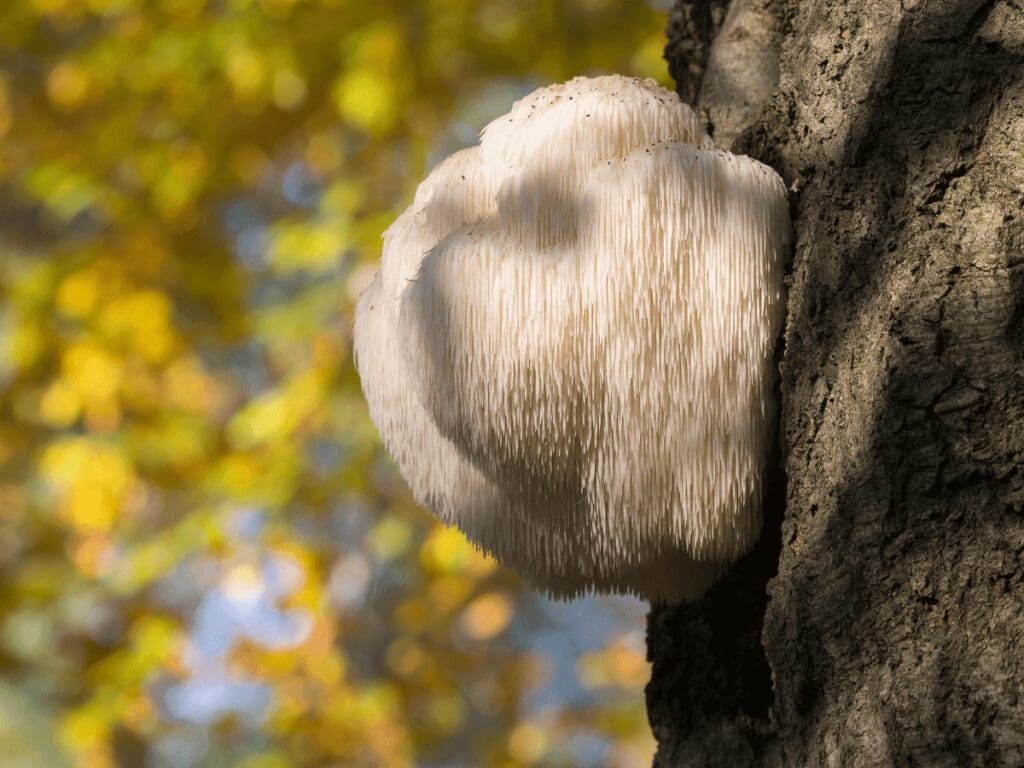Key Takeaways:
- Cognitive Enhancement: Lion’s Mane mushroom is renowned for its cognitive-enhancing properties, significantly improving memory and mental clarity through the stimulation of nerve growth factor (NGF).
- Safety Profile: Although generally safe for most people, Lion’s Mane can cause mild side effects such as digestive upset and should be used cautiously by those on certain medications or with specific health conditions.
- Non-Psychedelic Nature: Contrary to some misconceptions, Lion’s Mane does not produce psychedelic effects or alter sensory perceptions and emotional states like classical psychedelics do.
Happy Hemp, renowned for its high standards and innovative approach,is at the forefront of exploring the benefits of natural supplements. Central to our expertise is the Lion’s Mane mushroom, known for improving brain health and its unique use in cooking.
Native to the forests of North America, Europe, and Asia, this distinctive fungus is named for its flowing, white spines that resemble a lion’s mane. Traditionally valued in Eastern medicine for its brain-boosting properties, Lion’s Mane is now explored in the West for its potential as a powerful nootropic. This article will discuss its purported effects, addressing whether it acts as a psychedelic, how it compares to other nootropics, its optimal usage for health benefits, and the scientific evidence supporting its use. Additionally, we’ll cover practical information on the various forms it comes in, recommended dosages, and any potential risks associated with its consumption. Join us as we explore whether Lion’s Mane is merely a natural wonder or a foundational tool for cognitive and neurological health.
For those looking to explore the wellness world of Lion’s Mane mushrooms Lion’s Mane, Happy Hemp’s Lion’s Mane Mushroom Gummies offer a variety of other beneficial fungi to complement your health journey. These gummies provide a simple and enjoyable addition to your daily routine, blending tradition with the convenience of modern wellness solutions.
Exploring The Psychedelic Nature of Lion’s Mane
Defining Psychedelics
Psychedelics are a class of psychoactive substances that profoundly alter perception, mood, and numerous cognitive processes. These effects are primarily mediated through interaction with serotonin receptors in the brain, specifically at the 5-HT2A receptor site, which affects how we perceive the world. The resulting altered states of consciousness are characterized by visual and auditory distortions, deep emotional shifts, and the emergence of unusual thoughts or insights. Substances such as LSD, psilocybin (found in magic mushrooms), and mescaline (from peyote cacti) are among the most well-known psychedelics.
Investigating Claims
Lion’s Mane mushroom does not contain psilocybin or any other traditionally recognized hallucinogenic chemicals. Its influence on the brain is primarily through its unique compounds, hericenones and erinacines, which enhance the synthesis of nerve growth factor (NGF). NGF is essential for the growth and survival of neurons, and while it supports cognitive functions and neural health, it does not induce the psychedelic effects associated with serotonin receptor modulation. Current scientific literature supports its use as a cognitive enhancer rather than a psychedelic.
Clarifying Misconceptions
There is a growing body of anecdotal evidence where users of Lion’s Mane report feelings of mental clarity and emotional uplift that some describe in terms akin to psychedelic experiences. However, these effects are due to its nootropic properties—enhancing cognitive function and overall brain health—not because it induces a psychedelic state. Such misconceptions may arise from a misunderstanding of what psychedelics are and the distinct mechanisms through which nootropics operate. It’s crucial for both potential users and healthcare providers to understand that while Lion’s Mane can significantly improve mental function, it does not cause hallucinations or alter reality like classic psychedelics do.
How Lion’s Mane Enhances Brain Health
An Overview of Nootropics
Nootropics, commonly known as “smart drugs” or cognitive enhancers, are substances that can improve brain function, particularly executive functions, memory, creativity, or motivation, in healthy individuals. These compounds range from well-known caffeine and nicotine to complex dietary supplements and prescription drugs.
The Cognitive Benefits Of Lion’s Mane
Research suggests that Lion Mane’s two unique compounds, hericenones and erinacines, promote the synthesis of nerve growth factor, which is crucial for the maintenance and growth of neurons in the brain. This activity not only helps improve memory and cognitive agility but may also offer protective benefits against the onset of cognitive decline associated with aging diseases like Alzheimer’s.
Mechanisms Of Action
The primary action of Lion’s Mane in the brain involves the enhancement of nerve growth factor levels, which supports neuron development and repair. This effect is crucial for maintaining synaptic plasticity, which is essential for learning and memory. Furthermore, studies have indicated that Lion’s Mane may also have anti-inflammatory effects that could protect against neurodegeneration by reducing oxidative stress and cellular damage in the brain tissue.
Comparing Lion’s Mane And Psychedelics
Psychological Effects
Lion’s Mane and classical psychedelics, such as LSD and psilocybin, exhibit significantly different psychological effects. Psychedelics are renowned for inducing deep alterations in consciousness, including enhanced sensory perceptions and profound emotional shifts that can lead to introspective, and sometimes spiritual experiences. These effects can profoundly alter one’s perception of reality, often described as mind-expanding. In contrast, Lion’s Mane enhances cognitive functions such as memory, focus, and mental clarity without impacting sensory perceptions or emotional states.

Chemical Composition
From a chemical standpoint, Lion’s Mane mushroom and traditional psychedelics belong to completely different categories. Lion’s Mane contains bioactive compounds like hericenones and erinacines. These compounds are non-psychoactive and do not interact with serotonin receptors, which are the primary action sites for psychedelics. Psychedelics, however, typically mimic serotonin, impacting various neurotransmitter systems to produce their characteristic mind-altering effects.
Therapeutic Uses
Lion’s Mane is sought after for its cognitive enhancing properties and its potential role in neuroprotective strategies against diseases like dementia and Alzheimer’s. It supports brain health through mechanisms that promote neural growth and reduce inflammation. Conversely, psychedelics are being explored for their potential in psychological and psychiatric applications, aiding significantly in the treatment of depression, PTSD, and existential anxiety, often by facilitating profound, transformative experiences that can reframe personal perspectives and emotional responses. This makes psychedelics particularly valuable in therapeutic settings where emotional breakthroughs are essential.
What Research Says About Lion’s Mane
Key Studies And Findings On Lion’s Mane
Numerous studies have documented improved memory and cognitive function in older adults when Lion’s Mane was regularly consumed. Studies on animal models also demonstrated its potential in accelerating recovery from nervous system injuries and its neuroprotective effects against degenerative diseases like Parkinson’s and Alzheimer’s.
Effectiveness And Limitations
While the evidence supporting Lion’s Mane’s cognitive benefits is compelling, it is important to approach these findings with a balanced perspective. Many studies have been conducted with small sample sizes or in animal models, which may not fully translate to human experiences. Furthermore, the long-term effects and optimal dosages for humans still require more robust clinical trials to establish clearer guidelines and confirm its safety and effectiveness over time.
Future Directions In Lion’s Mane Research
The scientific community remains enthusiastic about the potential of Lion’s Mane in cognitive and neurological health. Future research is expected to focus on larger, more diverse human trials to better understand its benefits across different populations. Additionally, researchers are interested in exploring its possible synergistic effects when combined with other nootropics and its long-term impacts on brain health. Understanding its full potential will likely unlock new therapeutic applications and optimize its use in cognitive enhancement and disease prevention.
How To Use Lion’s Mane For Optimal Health Benefits
Forms And Dosages
Lion’s Mane is available in several forms to suit different preferences and usage goals. Here’s a detailed look at each option:
- Fresh Mushrooms: Ideal for culinary use, fresh Lion’s Mane can be cooked and eaten like any other mushroom. Its flavor is reminiscent of seafood, specifically crab or lobster, making it a popular meat substitute in vegetarian dishes. Using fresh mushrooms ensures you’re getting the bioactive compounds without any processing, which might degrade some nutrients.
- Dried Powder: This form is versatile and easy to store. Dried Lion’s Mane powder can be added to smoothies, teas, or even sprinkled on foods. It is often preferred for its convenience and longer shelf life, making it a straightforward way to incorporate Lion’s Mane into your daily diet without significant preparation.
- Capsules: Capsules provide a consistent dose of Lion’s Mane, which can be crucial for those using it specifically for its cognitive benefits. They are convenient for people who do not like the taste of mushrooms or do not have time to prepare the fresh or powdered forms. Capsules can vary in strength, generally ranging from 500 mg to 1,000 mg each.
- Liquid Extracts: Liquid forms of Lion’s Mane extract are concentrated and designed for quick absorption. They can be added to drinks or taken directly and are particularly useful for those seeking to tailor their dosage precisely or for rapid effect.
When starting with Lion’s Mane, it’s advisable to begin with a lower dosage—perhaps half of the recommended dose on the product packaging—and gradually increase it to gauge how your body reacts. This approach helps minimize any potential side effects and identifies the optimal dose for your needs. Always choose products from reputable manufacturers to ensure quality and efficacy.
Best Practices For Incorporating Lion’s Mane Into Your Diet
Incorporating Lion’s Mane into your diet can be both beneficial and enjoyable. The fresh or dried mushroom can be used in culinary recipes, particularly in dishes where its meaty texture and mild, seafood-like flavor can shine, such as in stir-fries or soups. For those looking for ease and convenience, powdered forms can be mixed into smoothies, teas, or coffees. Consistent daily intake is recommended to achieve the best cognitive and neurological health benefits.
Combining Lion’s Mane With Other Nootropics
Lion’s Mane can be combined with other nootropics for enhanced cognitive effects. For example, pairing it with Rhodiola rosea can enhance energy levels and mental clarity, while stacking it with Ginkgo biloba may improve memory and attention. It’s crucial to consult with a healthcare provider before starting any new supplement regimen, especially when combining different nootropic agents, to avoid potential interactions and optimize benefits.
Potential Risks And Side Effects Of Lion’s Mane
Common Side Effects And How To Mitigate Them
While Lion’s Mane is generally considered safe for most people, some individuals may experience side effects, particularly when taking high doses. Common adverse effects include digestive upset, such as gas or bloating, and in rare cases, allergic reactions characterized by skin rashes or difficulty breathing. To minimize these risks, it is advisable to start with a lower dose and gradually increase it while monitoring your body’s response. Ensuring the supplement is sourced from a reputable provider can also help mitigate potential contaminants that could cause adverse reactions.
Interactions With Medications And Other Supplements
Lion’s Mane has the potential to interact with certain medications, particularly those that affect blood clotting (such as anticoagulants) or regulate blood sugar levels. The mushroom’s bioactive compounds may enhance the effects of these medications, leading to complications. Additionally, its impact on the immune system could interfere with immunosuppressive drugs. Consulting with a healthcare professional before starting Lion’s Mane, especially if you are on medication, is essential to prevent harmful interactions.
Precautions For Specific Populations
Certain populations should exercise caution when considering the use of Lion’s Mane. Pregnant and breastfeeding women, for instance, are advised to avoid its use due to the lack of extensive research on its safety in these groups. Individuals with known mushroom allergies should also steer clear of Lion’s Mane, as it could trigger allergic reactions. As always, before beginning any new supplement, discussing it with a healthcare provider is crucial, especially for those with pre-existing conditions or those taking other medications.

Final Thoughts
Lion’s Mane mushroom represents a significant and promising component of natural nootropic supplements due to its unique ability to enhance cognitive functions and potentially aid in the prevention of neurological diseases. Its benefits, which range from improving memory and mental clarity to supporting nerve growth and reducing inflammation, make it a valuable addition to the regimen of those seeking natural health solutions.
As research into Lion’s Mane and other natural nootropics continues to expand, we can expect to see more refined uses, backed by robust clinical data, which will help in understanding its full potential and therapeutic applications. The ongoing interest in optimizing brain health and preventing cognitive decline will likely keep Lion’s Mane in the spotlight as a safe and effective supplement that offers more than just the promise of improved mental performance.
Read also:
- Discover the Power of Happy Hemp’s Amanita Muscaria Mushroom Gummies: A New Dimension in Natural Wellness
- Exploring Amanita Muscaria Effects: What happens if I eat Amanita Muscaria?
- Unlocking the Power of Mushroom Supplements: Immune Support and Cognitive Enhancement
Frequently Asked Questions About Psychedelic Lion’s Mane
Does Lion’s Mane contain any psychoactive substances?
Lion’s Mane does not have psychoactive substances that produce hallucinogenic effects. It does contain compounds like hericenones and erinacines which benefit cognitive health, but these do not alter consciousness.
Can Lion’s Mane make you high?
Lion’s Mane cannot make you high as it lacks the psychedelic compounds like psilocybin that are responsible for the psychoactive effects found in other types of mushrooms.
Is Lion’s Mane used for mental health?
Yes, it is often used to support mental health due to its potential effects on improving mood and cognitive function, and it may help reduce symptoms of anxiety and depression.
What does taking Lion’s Mane feel like?
While it doesn’t induce a psychedelic experience, users often report feeling more focused and mentally clear. It may also contribute to a sense of overall well-being due to its health benefits.
Can Lion’s Mane improve memory?
Studies suggest that Lion’s Mane may enhance memory and cognitive functions due to its nerve growth factors.
Is Lion’s Mane legal?
Yes, Lion’s Mane is legal to purchase and consume in various forms like fresh mushrooms, powders, and supplements.
What makes Lion’s Mane different from psychedelic mushrooms?
Unlike psychedelic mushrooms, Lion’s Mane does not contain psilocybin and does not cause alterations in perception or consciousness.
Can Lion’s Mane support the immune system?
Yes, its polysaccharides and other bioactive compounds are believed to boost the immune system.
Is Lion’s Mane good for gut health?
Yes, it contains digestive enzymes that aid in nutrient absorption and overall digestive health.
Sources:
- Ghosh, S., Nandi, S., Banerjee, A., Sarkar, S., Chakraborty, N., & Acharya, K. (2021). Prospecting medicinal properties of Lion’s mane mushroom. Journal of Food Biochemistry, 45(8), e13833.
- Wong, K. H., Naidu, M., David, R. P., Bakar, R., & Sabaratnam, V. (2012). Neuroregenerative potential of lion’s mane mushroom, Hericium erinaceus (Bull.: Fr.) Pers.(higher Basidiomycetes), in the treatment of peripheral nerve injury. International journal of medicinal mushrooms, 14(5).
- He, X., Wang, X., Fang, J., Chang, Y., Ning, N., Guo, H., … & Zhao, Z. (2017). Structures, biological activities, and industrial applications of the polysaccharides from Hericium erinaceus (Lion’s Mane) mushroom: A review. International journal of biological macromolecules, 97, 228-237.
- Friedman, M. (2015). Chemistry, nutrition, and health-promoting properties of Hericium erinaceus (Lion’s Mane) mushroom fruiting bodies and mycelia and their bioactive compounds. Journal of agricultural and food chemistry, 63(32), 7108-7123.
- Shang, X., Tan, Q., Liu, R., Yu, K., Li, P., & Zhao, G. P. (2013). In vitro anti-Helicobacter pylori effects of medicinal mushroom extracts, with special emphasis on the Lion’s Mane mushroom, Hericium erinaceus (higher Basidiomycetes). International Journal of Medicinal Mushrooms, 15(2).







